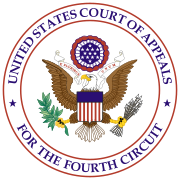| Urofsky v. Gilmore | |
|---|---|
 | |
| Court | United States Court of Appeals for the Fourth Circuit |
| Full case name | Melvin I. Urofsky, et al. v. James S. Gilmore, III |
| Decided | June 23, 2000 |
| Citation | 216 F.3d 401 (4th Cir. 2000) |
| Case history | |
| Prior actions | Urofsky v. Allen, Civil Action No. 97-701-A (United States District Court for the Eastern District of Virginia) |
| Appealed from | United States District Court for the Eastern District of Virginia |
| Appealed to | Supreme Court of the United States |
| Subsequent action | Supreme Court certiorari denied. |
| Court membership | |
| Judges sitting | United States Court of Appeals for the Fourth Circuit, en banc |
| Keywords | |
| First Amendment to the United States Constitution, freedom of speech, obscenity, sexually explicit | |
Urofsky v. Gilmore, 216 F.3d 401 (4th Cir. 2000), is a case decided before the United States Court of Appeals for the Fourth Circuit which concerned the matter of professors challenging the constitutionality of Virginia law restricting access to sexually explicit material on work computers. The American Civil Liberties Union (ACLU) joined the professors in the case against the state of Virginia. A three-judge panel of the Fourth Circuit overturned an earlier ruling by the District Court, and upheld the Virginia law.
The ACLU then requested an en banc hearing of the entire Fourth Circuit, which determined that university instructors do not have a right guaranteed by the United States Constitution to view sexually explicit material on facility computers. The ACLU then appealed this decision to the Supreme Court of the United States. The Supreme Court refused to hear the case, and the ruling by the Fourth Circuit remained in effect.